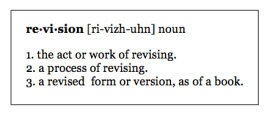 Recently, Rach Writes posted a quote from a post written by Mary Kole titled Big Revision on Kidlit.com. One line (two, for those of you who want to get technical) in particular, clarified the difference between sort of being committed to revising a manuscript and complete commitment to manuscript improvement.
Recently, Rach Writes posted a quote from a post written by Mary Kole titled Big Revision on Kidlit.com. One line (two, for those of you who want to get technical) in particular, clarified the difference between sort of being committed to revising a manuscript and complete commitment to manuscript improvement.“Let me say it here once and for all: unless you make big changes, a revision isn’t worth doing. If you go out on a submission round and get roundly rejected, you’re not going to solve your problem by going back to the page to tweak a few words here and there.” – Mary Kole
During the first rounds of the editing process, writers:
- fix typos
- correct grammar errors
- correct punctuation errors
- ensure characters are believable and consistent from beginning to end
- double-check for plot holes
- make sure readers are well-oriented with the setting
- include the senses (sight, sound, smell, taste, touch [and where applicable sixth sense]) into each scene
- etc.
This process yields a polished manuscript ready to submit to agents, editors, or publishers depending on the authors career goals. Sometimes, even after the daunting task of revisions, fundamental changes to the manuscript are necessary.
This is where Mary Kole’s advice comes into play. It takes total commitment to improve a manuscript. Writers have to be willing to let go of carefully selected words, beautiful prose, even entire pages for the good of the manuscript. When something in the story isn’t working, we can’t just change a few words in hopes of making it better. We must put in the effort and do the hard word to fix it, even if that means throughout portions of the story and starting fresh.
This week, DearEditor.com is hosting a Revision Week where eight prolific, bestselling, award-winning authors give insight to their revision process. One of my favorite questions the Editor asks is about the most drastic thing an authors have done. Some major thinking outside of the box. I’ve learned much through their interviews.
Has your work ever needed major revisions? Care to summarize why and how you fixed it? How do you know when to put down the proverbial red pen?
Related articles
- Bonus Post: Dear Editor Contest (writesbymoonlight.wordpress.com)
Very good points, Natasha. I’m not to the query stage yet, but after getting several critiques that said the same thing. I had to totally rewrite chapter 1 of my first ms. The old chapter 1 didn’t get deleted, just tweaked and buried deeper in the story. It was hard to do – I had grown fond of that chapter as the opener – but the story is so much better for the change.
I’ve also had to cut lots of phrasing during the crit and edit phase. What I do to make ‘killing off my little darlings’ easier on myself (besides saving a copy of the old version) is keep a file of the phrases and paragraphs I cut that I thought were especially well-written. I can always go there to pick one for something else or use them as inspiration.
Hacking up your work is hard, but if you save a copy of the old version, you’ll find chopping away in the new doc a much easier task. ; )
Glad you were open to hearing and applying feedback. I have the same rule, no matter how much I love a word/paragraph/page/scene, if it doesn’t work for multiple critique partners, I have to let it go.
Mary Kole has a good point–sometimes you gotta rip and tear to make the best changes.
Nice post!
Agree 100%
This is why critique partners and beta readers can be SO helpful. They can see things that you might not have noticed otherwise, and they can give you honest feedback on what works, what doesn’t, what makes them bored, and what makes them excited.
I find an outside perspective invaluable too. My critique partners have helped me improve my work exponentially. We learn by being open to applying feedback from critiques AND by critiquing each other.
I’ve definitely done some big revisions – like page one rewrites. Figuring out when I’m done revising is still something that I’m having trouble with.
Maybe by the time I’m at the end of the ‘How to Revise your Novel’ course I’ll understand a bit better 🙂
I had to completely let go of my original first pages for my YA paranormal BLINK. It hurt. And it’s so much better now.
Putting down the ‘pen’ still alludes me because I learn something new about this craft almost everyday and I’m eager to apply those techniques. 🙂
I had a manuscript that a CP told me was the wrong genre. She was right too. I rewrote the entire thing and it made so much more sense when I got the genre right. A lot of work, but definitely worth the effort.
I think you win the award for most dramatic revision! Glad it worked out.
You have to have such a multi-tasking brain when editing. There are SO many things to look out for!
[…] Committing to Manuscript Improvement Share this:TwitterFacebookLike this:LikeBe the first to like this post. […]
[…] Committing to Manuscript Improvement (writesbymoonlight.wordpress.com) Share this:Like this:LikeBe the first to like this post. […]
[…] Committing to Manuscript Improvement (writesbymoonlight.wordpress.com) […]